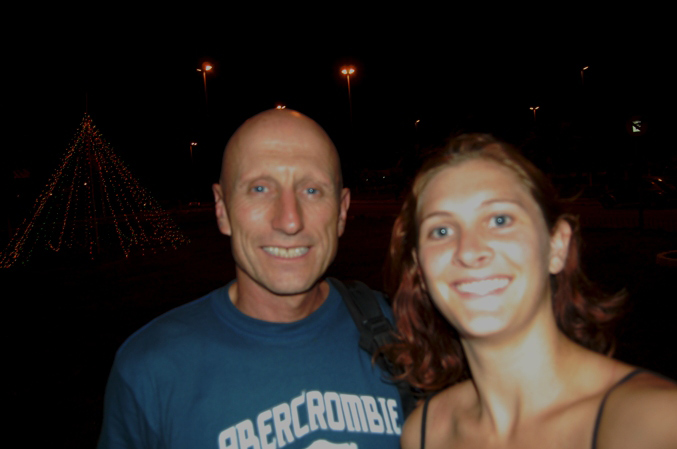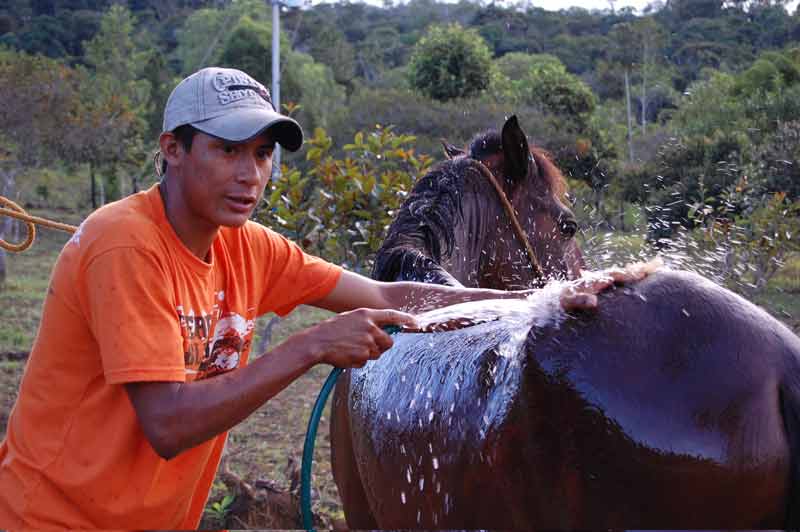I met with Manfred Mönnighoff in a café in Santa Elena. He drove me with his 6 year old daughter Nilaya, twenty minutes up a bumpy dirt road, through some beautiful emerald hills, to Foundation Peace Villages. It was a short but fantastic trip, full of nature. Arriving at the foundation, I saw horses, which I was given the opportunity to ride in the afternoon through forests and sand pits until the sun came out, and I met with Manfred’s wife Kenia, and another man Nilton who takes care of the horses. Everyone was warm and welcoming, and I felt completely relaxed after my long and tiring bus trip.
Unfortunately, because it is so close to Christmas, all of the volunteers have gone home or traveling for the holidays. One female volunteer though, was placed (the same morning that I arrived), in a village deep in the Savannah. She will be living with a community for the next three days, helping to run a personal growth workshop for disadvantaged youths.
Peace Villages was created by Manfred, who has had about thirty years of experience volunteering all around the world for over one hundred organisations. He began volunteering in Germany when he was only 20 years old, and when he turned 25 he began a construction firm. He worked in this firm for the next ten years, but continued volunteering part time. When he was 35 he finished his work and used his savings to continue volunteering and helping people.
Manfred began his work in Merida, where he also met his wife Kenia. Together, they left Merida in 2000, to go and live in a shanty town in Caracas, where they became accustomed to being robbed at least once a week. They spent their time running classes in spare rooms that priests and other people could offer them. They ran physical and occupational therapy classes for handicapped children, in which they needed to hire body guards to protect the therapists who entered the dangerous town. They also worked with street children in parks, giving group and individual therapy sessions to help release their traumatic past and re-connect with their parents. Another workshop they ran was for young pregnant mothers (some who were only 12 years old). They would teach the mothers about nutrition and how to cook, and also helped them to be psychologically prepared for their future with their child.
In April 2002, President Chavez was taken captive for a few days during a coup etat and his government toppled only to be reinstated a few days later. Supposedly the American CIA was involved, and civil unrest broke out. When Manfred and Kenia (who was at this stage three of four months pregnant) looked out their window, they could see light streams from gun-fire. Violence and unrest increased dramatically in the aftermath of the coup and so they decided to leave. They left their aid programs in the hand of local neighbourhood churches and went to the bus station with all of their things and asked where the furthest village from Caracas was. Someone told them there was a bus leaving to Santa Elena, and so they hopped on and went to start a new life there.
In 2003, in Santa Elena, Manfred used the last of his savings to buy property in which a foundation could be based and infrastructure could be incorporated. He and Kenia began attracting international volunteers and started a handicapped school that same year called ¨Tucusito (Hummingbird), which the volunteers previously decorated, and where music, ceramic, English and computer classes were opened.
They then began a mobile school for youth at risk. Many parents work as gold-miners, and so aren’t around to take care of their children. The kids spend their time just hanging out on the streets and are at risk of falling into the hands of people like drug traffickers and delinquents. The mobile school offers an interesting and educational outlet. It runs on wheels and converts into boards, where up to ten children can learn at the same time. They are educated about the alphabet, health care, children’s rights, sexuality, maths, science and even theatre. The mobile school also helps the kids to learn how to read and write, and is packed with games and puzzles, which helps to stimulate their mental growth.
Conservation Ambiental is another program run by Peace Villages and its volunteers, where the children help to clean parks, plant trees and repair equipment (such as play equipment) in schools. Pupils learn about the environment, and are always involved in each project so that a culture of volunteerism and cultural exchange is created within their generation.
Skills training for special needs children (eg. for handicapped, low income and at risk kids) is another program here. The children learn how to make wooden toys, which they then give away to kindergarten and day care centres. Peace Villages also sends assistant volunteer workers to the day care centres in Santa Elena and offers children toys and play sessions. The centres are very poor, most have no toys, and children are bored and fight all the time. Because the Venezuelan caretakers are underpaid and there is always a television within the centres, they don’t really care about the kids and don’t offer them much attention.
As well as helping children with education, Peace Villages runs a therapeutic horse riding program, where special needs children who are either at risk, have learning difficulties, behavioural problems, or who are handicapped, learn to ride horses. There was also a radio program run by the foundation, that started two years ago but recently had to close due to lack of funds. It was run each day for an hour and raised parenting and educational issues.
Peace Villages is financed solely by the volunteers who come here. Prices to come and stay are very modest and range to suit the type of volunteer experience that you are in search of. There are options to stay with host families, in hotels and hostels, or within a cooperative living setting (which includes all meals) at the foundations grounds in a beautiful setting just outside the village on a small hill surrounded by savannah and rainforest. There is an open book within the foundation and also online, where you can see exactly where the money you give is going. The money is used for things such as maintenance, administration, and salaries, accommodation and full board for the volunteers and for full time Venezuelan head teachers (one for each program).
Because of the economic crisis volunteers may soon be prevented or slowed down from coming here.
In 2004, the first volunteers began coming to Peace Villages and Manfred has since been conducting a social experiment about co-operative living. He has built up an international community focussing on the common interest of service and outreach. Every week a program is run where the volunteer decide where and when they work, and how many hours they would like to commit to volunteering. They can work for an hour per week or forty, whatever they choose (there is always plenty of work)- but they are never judged. This is because they have already made a huge contribution by coming to the foundation and paying a donation. They can even work on one program, and then swap to others, giving the volunteer a wide range of different experiences. Gardening and planting is also an option, as well as working in the town hospital or volunteering and living side by side with indigenous Pemon host family in a remote aboriginal community.
Volunteers can spend their week climbing mountains and seeing sights, and can also reduce the amount of weekly hours they initially decided to work if need be. It is not about the amount of hours worked, but about making minimum commitments and sticking to them. The last thing that Manfred wants is for the volunteers to burn out and not be able to give their full attention and loving support to the children.
Peace Villages has a great energy and is a very liberal place to volunteer at. People cook and clean together and spread tasks weekly and evenly on a rotating basis. It is a place of respect where people take care of each other; people think more about others than themselves here. People of all ages work here, from families with eight year old children, to eighty year old men and women.
Manfred feels the best part of his job is meeting so many different people from all over the world and living in a community style environment with like-minded people of all ages and walks of live. He is doing what he’s doing because he wants to help the vulnerable people in society like young children and at risk or special need youth.?I feel that Peace Villages is a wonderful place for volunteers to come. The surrounding nature enhances the happy and relaxing atmosphere, while the liberal, yet responsible approach to volunteering creates a true feeling of freedom. Peace Villages foundation provides an original and extremely pleasant environment to live and volunteer in… perhaps one of the best I have come across!
To volunteer at Peace Villages or to donate please visit www.peacevillages.org or email info@peacevillages.org
There are fantastic opportunities for people with strong organizational and multi-lingual skills, who have had substantial volunteer and cultural experiences, to work as program initiators and leaders throughout many countries, with full training and support from Peace Villages.
Manfred is also looking for a board of Venezuelan directors for Peace Villages, before he begins yet another Peace Villages site to help other children in the north of Brazil.


Hi.
I am interested in communicating with you and learn a little bit more about this organization in Santa Elena, Venezuela.
Please send me a reply to the email above. Once I receive your email and learn that you are still managing this organization, I will give details about me.
I am looking forward to read from you.
Best regards
lisa